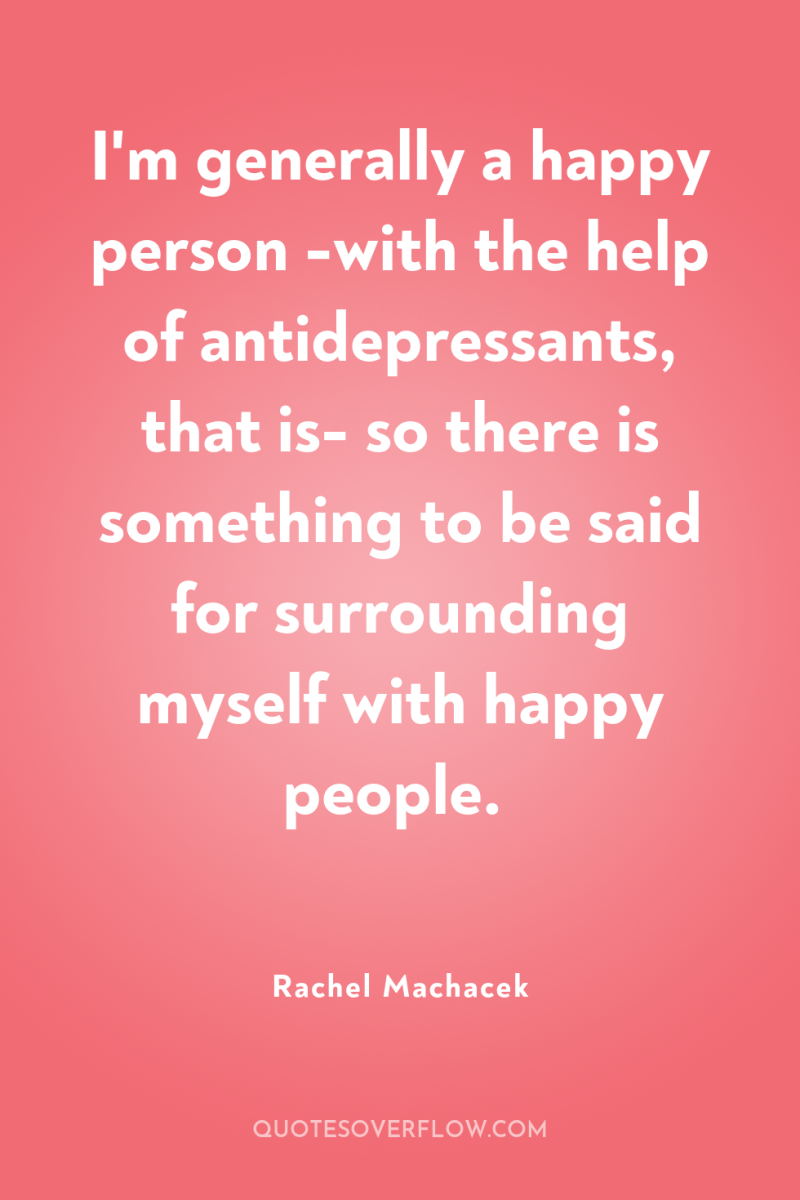
1
I'm generally a happy person -with the help of antidepressants, that is- so there is something to be said for surrounding myself with happy people.Rachel Machacek
2
Physicians do not systematically prescribe placebos to their patients. Hence they have no way of comparing the effects of the drugs they prescribe to placebos. When they prescribe a treatment and it works, their natural tendency is to attribute the cure to the treatment. But there are thousands of treatments that have worked in clinical practice throughout history. Powdered stone worked. So did lizard's blood, and crocodile dung, and pig's teeth and dolphin's genitalia and frog's sperm. Patients have been given just about every ingestible - though often indigestible - substance imaginable. They have been 'purged, puked, poisoned, sweated, and shocked', and if these treatments did not kill them, they may have made them better.Irving Kirsch
3
Sylvie wishes the anti-depressants had been around when she was in her early twenties, not only to rescue her from the dark tunnels that came when her brother first got sick, but also to keep her from fucking all those assholes.Francesca Lia Block
4
Even if we accept the view that biochemical imbalances may contribute to depression and suicide, it is a mistake to assume that the biochemical aspect of the problem is entirely within the victim. It is also partly within the physiological makeup of the people around the suicide.David L. Conroy
5
My sadness is beautiful. It infuses everything I do. It is at the core of my identity and always has been, just as happiness is in some people. I refuse to be told that it's a flaw. I will not mute it with medications for the sake of society. I will hold it close to me and celebrate it rightfully while the rest of the world fails to see it for what it is and it will be their loss.Ashly Lorenzana
6
Macbeth: How does your patient, doctor? Doctor: Not so sick, my lord, as she is troubled with thick-coming fancies that keep her from rest. Macbeth: Cure her of that! Canst thou not minister to a mind diseased, pluck from the memory a rooted sorrow, raze out the written troubles of the brain, and with some sweet oblivious antidote cleanse the stuffed bosom of that perilous stuff which weighs upon her heart. Doctor: Therein the patient must minister to himself.William Shakespeare
7
Depression, we are told over and over again, is a brain disease, a chemical imbalance that can be adjusted by antidepressant medication. In an informational brochure issued to inform the public about depression, the US National Institute for Mental Health tells people that 'depressive illnesses are disorders of the brain' and adds that 'important neurotransmitters - chemicals that brain cells use to communicate - appear to be out of balance'. This view is so widespread that it was even proffered by the editors of PLoS [Public Library of Science] Medicine in their summary that accompanied our article. 'Depression, ' they wrote, 'is a serious medical illness caused by imbalances in the brain chemicals that regulate mood', and they went on to say that antidepressants are supposed to work by correcting these imbalances. The editors wrote their comment on chemical imbalances as if it were an established fact, and this is also how it is presented by drug companies. Actually, it is not. Instead, even its proponents have to admit that it is a controversial hypothesis that has not yet been proven. Not only is the chemical-imbalance hypothesis unproven, but I will argue that it is about as close as a theory gets in science to being dis-proven by the evidence.Irving Kirsch
8
For people who are depressed, and especially for those who do not receive enough benefit from medication of for whom the side effects of antidepressants are troubling, the fact that placebos can duplicate much of the effects of antidepressants should be taken as good news. It means that there are other ways of alleviating depression. As we have seen, treatments like psychotherapy and physical exercise are at least as effective as antidepressant drugs and more effective than placebos. In particular, CBT has been shown to lower the risk of relapsing into depression for years after treatment has ended, making it particularly cost effective. .Irving Kirsch
9
The irony of taking Anti Depressants: you take them to feel good but they also make you feel bad or worse because you worry about your purse.Mico Monsalve
10
Pain could be killed. Sadness could not, but the drugs did shut its mouth for a time.Colson Whitehead
11
How many artists have created while drunk, high on laudanum, opium, chloral or amphetamines? What have antidepressants ever done for culture?Hanif Kureishi
12
Our analyses of the FDA data showed relatively little difference between the effects of antidepressants and the effects of placebos. Indeed, the effects were so small that they did not qualify as clinically significant. The drug companies knew how small the effect of their medications were compared to placebos, and so did the FDA and other regulatory agencies. The companies found various ways to make the data seem more favorable to their products, and the FDA helped them keep their negative data secret. In fact, in some instances, the FDA urged the companies to keep negative data hidden, even when the companies wanted to reveal them. My colleagues and I hadn't really discovered anything new. We had merely revealed their 'dirty little secret'. .Irving Kirsch
13
Unbeknownst to me, from the beginning of freshman year Rob and Oswaldo had been drawn away from Yale via their friends on the dining hall and custodial staffs, outward into the city of New Haven. Rob considered these excursions a much-needed dose of reality, the social equivalent of an antidepressant.Jeff Hobbs